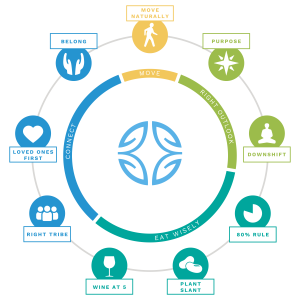Why are people in some parts of the world living until a hundred years of age? Is it an ancient secret? Is it luck? Maybe, but it’s mainly lifestyle choices.
The term ‘Blue Zone’ describes regions of the world where people live longer than average, maintain good health, and where there are particularly high numbers of centenarians. It was first devised by Dan Buettner, a National Geographic explorer and journalist, during an exploratory project he led in 2004.
The name “blue zones” derived simply from using a blue pen on a map to mark villages with a long-lived population. After an expedition to Okinawa, Japan, in 2000 to investigate the longevity there, Dan Buettner set out to explore other regions of the world with reportedly high longevity.
In his book “Blue Zones, The: Lessons for Living Longer From the People Who’ve Lived the Longest (The Blue Zones)”, Dan Buettner names the following five regions that are currently known as Blue Zones:
- Okinawa (Japan): Known for the world’s longest-lived women, Okinawans maintain strong social networks through moais and stay active through traditional activities like gardening and manual labor.
- Sardinia (Italy): Home to the world’s longest-lived men, Sardinians, walk significant distances daily in their mountainous terrain, contributing to their longevity.
- The Nicoya Peninsula (Costa Rica): Nicoyans achieve exceptional longevity with a fraction of America’s healthcare spending, emphasizing strong community ties, faith, and a sense of purpose through Plan De Vida.
- Ikaria (Greece): Ikarians enjoy extended lifespans with lower rates of cancer, heart disease, and dementia, attributed to their Mediterranean diet rich in fruits, vegetables, whole grains, beans, and olive oil, alongside a relaxed approach to managing stress.
- Loma Linda (California, USA): Adventists in Loma Linda live a decade longer than average Americans, adhere to a vegan diet centered around leafy greens, nuts, and legumes, and prioritize a balanced lifestyle.
Why do people in blue zones live longer?
Buettner’s exploration of blue zones revealed a striking pattern: across all five blue zones, Buettner identified nine core principles, termed the “Power 9,” which formed the foundation of longevity. The nine evidence-based common denominators among the Zones that are believed to slow this aging process are:

- Move naturally: Long-lived people live in environments that encourage constant movement through activities like gardening and manual housework.
- Purpose: Having a strong sense of purpose, termed Ikigai or Plan De Vida, can extend life expectancy by up to 7 years.
- Downshift: Managing stress through daily rituals like reflection, prayer, napping, or socializing helps reduce chronic inflammation and age-related diseases.
- 80% Rule: Eating until 80% full, a practice known as Hara Hachi Bu, prevents overeating and promotes healthy weight management.
- Plant slant: Centenarians emphasize a plant-based diet with beans as a primary protein source and limited meat intake, typically 5 times per month.
- Wine @ 5: Moderate and regular alcohol consumption, especially wine, enjoyed with meals and friends, is linked to longevity.
- Belong: Longevity is associated with belonging to a faith-based community, regardless of denomination, and attending services regularly.
- Loved ones first: Prioritizing family relationships, including caring for elders and investing in children, contributes significantly to longevity.
- Right tribe: Choosing or being part of social circles that support healthy behaviors and positive lifestyles is crucial for long-term health and well-being.
What can we learn from the Blue Zones in terms of lifestyle choices?
During a TEDxTalk, Dan Buettner explained that one prevalent myth regarding aging is the belief that trying hard can extend one’s lifespan significantly. The first myth is the belief that, with enough effort, anyone can live to be 100. In reality, only about one out of every 5,000 people in America reaches the age of 100. It’s a challenging milestone to achieve because our biology prioritizes procreative success—having children and ensuring the next generation—over longevity. This evolutionary programming means that reaching 100 requires not only a healthy lifestyle but also fortunate genetics.
The second myth suggests there are treatments that can slow, reverse, or stop aging. However, aging involves numerous factors that can’t simply be halted or reversed. From oxygen deprivation damaging brain cells to wear and tear on joints from physical activity, and the buildup of plaque in arteries leading to conditions like Alzheimer’s, our bodies face a multitude of challenges as we age. With 35 trillion cells constantly turning over and accumulating damage over time, aging is a complex process that cannot be stopped by any single treatment or intervention.
If there is no guarantee that someone can live a long life, then what can be done to promote longevity? #1 Eating healthy, natural foods
Focus on a plant-based diet that includes seasonal vegetables, fruits, whole grains, and legumes. Opt for fats from plants, like olive oil, and limit processed foods. Minimize meat intake and consider occasional fish consumption. If you consume dairy, choose fermented options.
#2 Incorporating physical activity into daily life
Incorporate regular physical activity into your daily routine, whether through gardening, manual tasks, or walking. Embrace an active lifestyle rather than relying on conveniences.
“People are living a long time, not because they have a daily practice, but because they’ve set up their surroundings, or they were born into surroundings, that nudge them into moving more,” Buettner said to CNBC.
#3 Reducing stress and enjoying the simple things in life
Manage stress by adopting rituals such as prayer, napping, or socializing to counteract its effects and reduce inflammation.
#4 Finding a purpose
Define and pursue a sense of purpose in life, as studies show it correlates with lower mortality risk. Having a clear sense of direction can contribute significantly to overall well-being.
#5 Surrounding yourself with the right people
Prioritize relationships and build a supportive social circle. Invest time in nurturing familial bonds and participating in community or faith-based groups. Surround yourself with positive influences, as healthy behaviors can be contagious.
Ultimately, achieving longevity isn’t just about following rules; it’s about embracing a holistic lifestyle. By integrating mindful eating, regular activity, stress management techniques, a sense of purpose, and strong social connections, you can enhance your chances of living a longer, healthier life.


































































